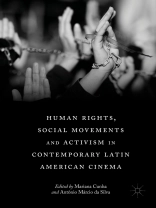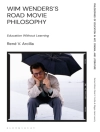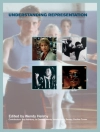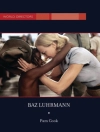This edited collection explores how contemporary Latin American cinema has dealt with and represented issues of human rights, moving beyond many of the recurring topics for Latin American films. Through diverse interdisciplinary theoretical and methodological approaches, and analyses of different audiovisual media from fictional and documentary films to digitally-distributed activist films, the contributions discuss the theme of human rights in cinema in connection to various topics and concepts.
Chapters in the volume explore the prison system, state violence, the Mexican dirty war, the Chilean dictatorship, debt, transnational finance, indigenous rights, social movement, urban occupation, the right to housing, intersectionality, LGBTT and women’s rights in the context of a number of Latin American countries. By so doing, it assesses the long overdue relation between cinema and human rights in the region, thus opening new avenues to aid the understanding of cinema’s role in social transformation.Tabla de materias
1. Introduction.- 2. Human Rights and the Shadow of Chile’s Dictatorship: Patricio Guzmán and the Poetics of a Cinematic Landscape.- 3. Rewriting the History of the Urban Revolutionary: Documentary Film and Human Rights Activism in Post-Dirty War Society.- 4. Human Rights Abuses and State Violence in Prison Films by Hector Babenco.- 5. Territories, Existence and Identities: Indigenous Peoples in Argentine Films.- 6. The Right to Nature: Contested Landscapes and Indigenous Territoriality in Martírio (2016).- 7. Urban Occupations: Cinema and the Struggle for the Right to Housing.- 8. The Art of the Social Movement Corrective: On Redeeming the Human Rights Narrative in También la lluvia and Our Brand is Crisis.- 9. Transnational Finance on the Road to the Andes: Societal Ruptures and Poisoned Deals in La deuda/Oliver’s Deal (2015).- 10. A Woman’s Right to Move: The Politics of Female Walking in Latin American Cinema.- 11. Intersectionality as a Human Rights Issue in Contemporary Latin American Queer Cinema.
Sobre el autor
Mariana Cunha is a postdoctoral research fellow (CAPES) at the Federal University of Pernambuco, Brazil. She holds a Ph D from Birkbeck, University of London, UK, and has published articles on cinematic space, landscape, nature, Brazilian and global contemporary cinema. She co-edited the volume Space and Subjectivity in Contemporary Brazilian Cinema (Palgrave Macmillan, 2017).
Antônio Márcio da Silva is Associate Lecturer at the University of Surrey and Queen Mary University of London, UK. His publications include the co-edited collection Space and Subjectivity in Contemporary Brazilian Cinema (Palgrave Macmillan, 2017), the monograph The ‘Femme’ Fatale in Brazilian Cinema: Challenging Hollywood Norms (Palgrave Macmillan, 2014) and a number of articles.












